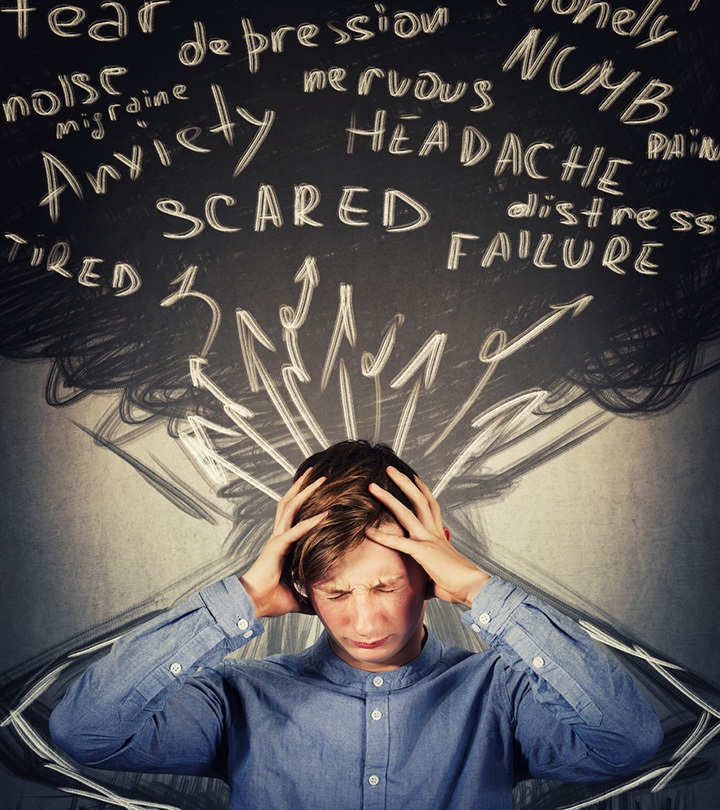Image: Shutterstock
Asperger’s syndrome or Asperger’s disorder belongs to a group of neurological disorders known as Autism Spectrum Disorders (ASDs). This condition is not considered a severe mental illness. However, it can affect the development of a teen’s social and communication skills.
Although teenagers with Asperger’s syndrome find it hard to communicate and act and show repetitive behavior, they have good language and cognitive skills (1).
Read on to learn about the symptoms, causes, management, and long-term outlook of Asperger’s syndrome in teenagers.
What Does Asperger’s Look Like In Teenagers?
To an untrained individual, a teen with Asperger’s may come across as a neurotypical child behaving differently. Teens with this disorder usually like to follow a monotonous lifestyle and hate any changes in their routines. Also, they may consider themselves a misfit among their peers and show disinterest in interacting with others.
They seem to make little or no eye contact, have few facial expressions, and come across as socially awkward as they may fail to understand conversations, gestures, or sarcasm. A teen with Asperger’s syndrome usually has less severe symptoms than a teen with autism, and they also don’t usually have speech delays (2).
What Are The Symptoms Of Asperger’s Syndrome?
The signs and symptoms of Asperger’s syndrome generally appear in early childhood and develop progressively in adolescence. The symptoms may vary among teenagers; however, some common symptoms include (1) (3):
- Avoiding social interactions and friendships.
- Sensitivity to light and sounds.
- Using nonverbal communication – not being able to converse despite having good language skills.
- Repeating behaviors and having a fixed routine and interests.
- Inability to empathize with others or comprehend typical social norms and instructions.
- Frequent aggressive or eccentric behavior – being frustrated if things don’t happen their way.
- Being emotional about things said to them and being overly sensitive to criticism.
- Difficulty making friends.
What Causes Asperger’s Syndrome In Teenagers?
The exact cause of Asperger’s syndrome is not known. However, experts believe that genetic, neurobiological, and environmental factors play a role.
In addition, Pregnancy-related aspects such as older parents during conception, chromosomal abnormalities such as fragile X syndrome, and medications taken by the mother for anxiety or mood disorders might also increase a child’s risk for Asperger’s syndrome (4).
Several genes are associated with Asperger’s syndrome, with the major one being the GABRB3 gene, which is also associated with other Autism spectrum conditions (5). Research is ongoing for understanding the different genetic variations and environmental factors that are potential triggering factors of this syndrome.
Note: Asperger’s syndrome is not caused due to bad parenting, immunization, or other social circumstances.
When To See The Doctor?
You may consider taking your child to a qualified health professional (child psychologist or speech pathologist) if they show any signs of autism or have difficulties in (6)
- Making friends of their age or speaking or playing with them.
- Communicating they seem to be awkward and lost).
- Understanding others’ perspectives and feelings.
- Understanding the nuances and depth of a language.
How Is Asperger’s Syndrome Diagnosed?
Diagnosis of Asperger’s syndrome is made by a medical professional experienced in studying autism spectrum disorders. It is based on thorough observation and assessment of the teen’s developmental history. In addition, the teen may be questioned to learn about their learning and social abilities, movement skills, and special interests.
The evaluation can take a few years and is usually done at home, school, or in a playroom setup (3). In addition, a doctor may conduct standardized screenings such as autism-specific screening tests and blood or genetic tests to look for any underlying inherited disorders such as fragile X syndrome or hereditary metabolic disorders (7).
What Are The Treatment Options For Asperger’s Syndrome?
There is no general and effective treatment strategy known for Asperger’s syndrome. However, a combination of medications and therapies to improve social, behavioral, and communication skills is proven to help teens with this condition.
- Medications: Risperidone and aripiprazole are FDA-approved drugs given to reduce the symptoms and control self-injurious behaviors. Selective serotonin reuptake inhibitors (SSRIs), such as fluoxetine and paroxetine are effective in reducing repetitive behaviors. Mood stabilizers and stimulants help control hyperactivity and eccentric behavior in teens (7)(8).
These drugs must be taken under the supervision of your child’s psychologist or doctor, as they pose a risk of side effects.
- Alternative therapies: Cognitive behavioral therapy, family therapy, and applied behavior analysis-based therapies may be recommended to help the teen build social skills and independent living skills such as punctuality and grooming.
- Other therapies include intravenous immunoglobulin therapy, individualized educational programs, auditory integration training, and specialized diet therapy (8). These therapies are not widely used as they are still being researched. Hence, you may consult the child’s physician before proceeding with any of these therapies to provide a personalized treatment regimen according to the child’s requirements.
Is There A Cure For Asperger’s Syndrome?
There is no cure for Asperger’s Syndrome (3). However, timely diagnosis can help you take the necessary steps to avert any potential risks. Moreover, with a vast range of treatment options available, it is now possible to treat and manage the condition.
Asperger’s syndrome is a mild form of autism and isn’t considered a severe psychiatric condition. However, if your child finds it difficult to cope with essential skills and academics, screening for Asperger’s becomes essential. Early diagnosis will aid in identifying and implementing tailored treatments and interventions that help the teen maximize their potential to learn, become socially active, and achieve a better quality of life. (9).
References:

